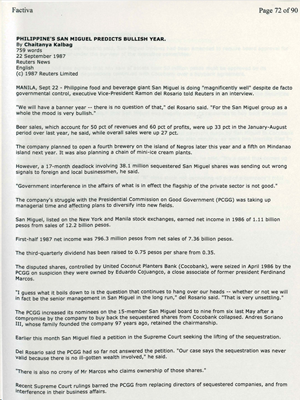PHILIPPINE’S SAN MIGUEL PREDICTS BULLISH YEAR
[Reuters]
Published date: 22nd Sep 1987
22 September 1987
Reuters News
English
(c) 1987 Reuters Limited
MANILA, Sept 22 – Philippine food and beverage giant San Miguel is doing “magnificently well” despite de facto governmental control, executive Vice-President Ramon del Rosario told Reuters In an interview.
“We will have a banner year — there is no question of that,” del Rosario said. “For the San Miguel group as a whole the mood is very bullish.”
Beer sales, which account for 50 pct of revenues and 60 pct of profits, were up 33 pct in the January-August period over last year, he said, while overall sales were up 27 pct.
The company planned to open a fourth brewery on the island of Negros later this year and a fifth on Mindanao island next year. It was also planning a chain of mini-ice cream plants.
However, a 17-month deadlock involving 38.1 million sequestered San Miguel shares was sending out wrong signals to foreign and local businessmen, he said.
“Government interference in the affairs of what is in effect the flagship of the private sector is not good.”
The company’s struggle with the Presidential Commission on Good Government (PCGG) was taking up managerial time and affecting plans to diversify into new fields.
San Miguel, listed on the New York and Manila stock exchanges, earned net income in 1986 of 1.11 billion pesos from sales of 12.2 billion pesos.
First-half 1987 net income was 796.3 million pesos from net sales of 7.36 billion pesos.
The third-quarterly dividend has been raised to 0.75 pesos per share from 0.35.
The disputed shares, controlled by United Coconut Planters Bank (Cocobank), were seized in April 1986 by the PCGG on suspicion they were owned by Eduardo Cojuangco, a close associate of former president Ferdinand Marcos.
“I guess what it boils down to is the question that continues to hang over our heads — whether or not we will In fact be the senior management in San Miguel in the long run,” del Rosario said. “That is very unsettling.”
The PCGG increased its nominees on the 15-member San Miguel board to nine from six last May after a compromise by the company to buy back the sequestered shares from Cocobank collapsed. Andres Soriano III, whose family founded the company 97 years ago, retained the chairmanship.
Earlier this month San Miguel filed a petition in the Supreme Court seeking the lifting of the sequestration.
Del Rosario said the PCGG had so far not answered the petition. “Our case says the sequestration was never valid because there is no ill-gotten wealth involved,” he said.
“There is also no crony of Mr Marcos who claims ownership of those shares.”
Recent Supreme Court rulings barred the PCGG from replacing directors of sequestered companies, and from Interference in their business affairs.
The PCGG’s nominees on the board had demanded changes to the firm’s by-laws, changes in its executive committee, and representation on the boards of its subsidiaries.
“(They) even wanted to review the compensation of our employees,” del Rosario said.
“If you look at the totality … there is no question that that would amount to interference in our business activities,” he added. “There have been points of tension.”
Under PCGG pressure, del Rosario said, San Miguel by-laws had been amended to require board approval for many decisions earlier under the purview of the executive committee.
The company had also agreed that any sale of assets over 50 million pesos must be approved by its stockholders. Meanwhile, negotiations continued with Cocobank over a buyback agreement.
The reason for the breakdown of an earlier compromise in April was unclear, del Rosario said, adding it may have been caused by a derivative lawsuit filed by PCGG director Eduardo de los Angeles before the Securities and Exchange Commission.
De los Angeles charged in his lawsuit that San Miguel was illegally using its resources to buy back the seized shares.
Del Rosario said another lawsuit, involving a 500 million peso initial payment made by San Miguel to Cocobank for the disputed shares just before the sequestration last year, was also pending, as were two lawsuits filed by Cojuangco.
Asked if board chairman Soriano’s U.S. citizenship had caused problems, he said, “It’s a point that comes up every so often. It hasn’t been helpful but It hasn’t been a major negative factor either.”
Philippine law restricts foreigners to ownership of “B” class stock not exceeding 40 pct of a company’s total capital.






